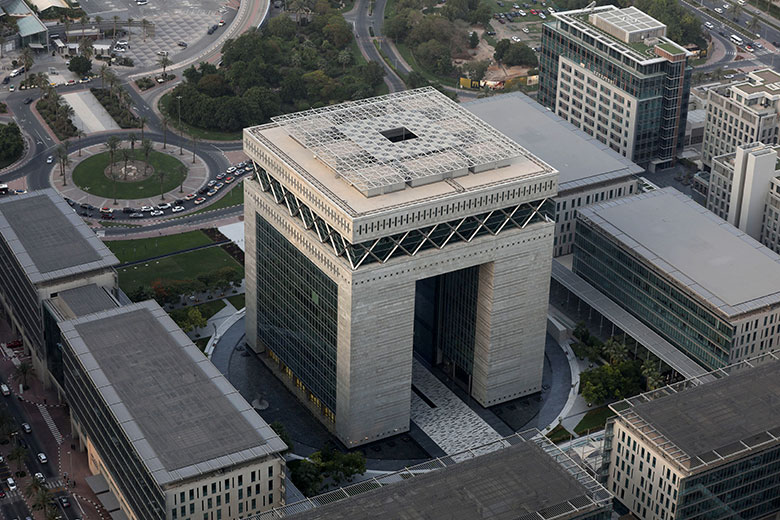The Dubai International Financial Centre
The UAE has inked a draft law encouraging family-owned businesses to list, while an emerging pensions industry in Dubai is expected to widen its net of investors – both marking key developments in the growth of the region’s capital markets.
Improving access to capital for the UAE’s corporates is essential to creating a sustainable, diversified economy as the region looks to a future without oil.
The move comes on the back of the Gulf’s inclusion in the MSCI and FTSE Russell indices, which has helped cement the region as a key focus for international investors.
The Cabinet of the United Arab Emirates’ draft law will facilitate the listing of family-owned businesses on domestic stock exchanges, a move which is expected to improve the diversity and liquidity of the Abu Dhabi Securities Exchange (ADX) and Dubai Financial Market, and is welcomed by bankers and investors.
“This type of reform and market engagement will drive additional improvements to the UAE business environment, including to the areas of corporate governance, reporting and market liquidity,” says Nick Wilson, chairman of the Gulf Investment Fund.
For investors, the move is an important development that will increase the diversity of stocks on option at the local exchanges, as well as the transparency and governance of the UAE’s corporates.
“ADX is dominated by banks and real estate, and investors don’t get much exposure to other sectors,” says a Dubai-based investment banker.
Cultural shift
However, while listing offers family-run companies access to liquidity, it may require a cultural shift in thinking, with many families unsure about giving up control of their businesses, according to Christophe Lalandre, managing director of Lombard Odier in the Middle East.
“Equity brokers in the country are very positive on this idea,” he says. “There will be more liquidity and more listings on the market.
“One message each group has to assess is that liquidity will be positive, but their independence will be different. It is a fundamental shift for the market, but it may take some time.”
The Dubai-based investment banker agrees that the proposal is positive for the market and offers families a way to access liquidity without relinquishing control of the whole business.
“Families weren’t happy to list majority stakes, so this is a way for them to list,” he says.
SMEs are a fundamental piece of the economy and the government is doing quite a few initiatives
– Amir Riad, Abu Dhabi Islamic Bank
The move should also boost access to funding for small and medium-sized enterprises (SMEs), which remain the most underserved part of the UAE’s economy.
“SMEs are a fundamental piece of the economy and the government is doing quite a few initiatives,” says Amir Riad, global head of corporate finance and investment banking at Abu Dhabi Islamic Bank (ADIB).
“They are introducing regulation and a bankruptcy law. This is a lifeline to the economy, which is in a cyclical rough patch.”
The draft law comes after Sheikh Mohammed bin Rashid Al Maktoum announced on January 14 the creation of the Dubai Future District, a new area dedicated to the development of the economy, as well as an AED1billion fund to support new economy companies.
Sheikh Mohammed also outlined plans to raise Dubai’s non-oil foreign trade to AED2 trillion by 2025.
Pension reform
Progress is also being made on the investor side, with the Dubai International Financial Centre’s (DIFC) new pension scheme adding variety to the UAE’s investor base, which is largely dominated by banks.
The DIFC’s first defined contribution pension fund, which launches on February 1, is expected to create a substantial pool of assets, which will need to be invested.
Though the region’s asset management industry is growing, its investor base is not well diversified and is largely limited to banks, which have a preference for extending shorter-term funding.
Around 40% of every Gulf bond is sold to the banks, which still hold the biggest pool of liquidity, say bankers. Gulf banks have a preference for five- to seven-year funding, meaning that options for longer-term financing are more limited.
|
Dino Kronfol, |
Dino Kronfol, chief investment officer, global sukuk and MENA fixed income at Franklin Templeton in Dubai, says that the scheme will be rolled out in the DIFC initially, with expectations of a successful role out of similar funds across the UAE.
“GCC [Gulf Cooperation Council] pension funds may reach $40 billion over the next five years, which is a significant pool of assets,” he says. “They will look to invest inside and outside of the region, too.”
The scheme will be managed by Mercer and Zurich, with Franklin Templeton’s sukuk fund one of 12 investment options.
“It’s very positive for the region, which needs to develop its long-term investor base,” says ADIB’s Riad.
Infrastructure spend in the GCC is estimated to total $1.6 trillion between 2019 and 2023, an increase of roughly 2.7 times from 2014 to 2018 levels, based on data compiled by the Middle East Economic Digest (MEED).
The next phase, bankers say, is developing the market depth and inventory needed to encourage active managers to invest in the region. Many funds remain underweight Gulf bonds and equities.


 Signal2forex.com - Best Forex robots and signals
Signal2forex.com - Best Forex robots and signals




